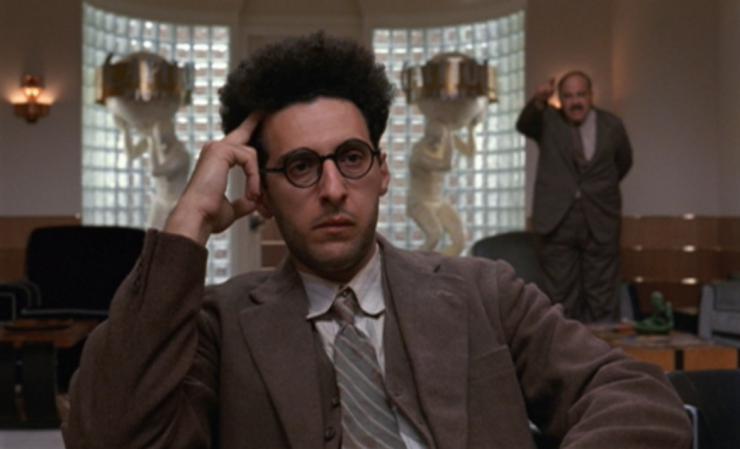That Barton Fink Feeling
As a young, un-established playwright, I’m often asked to logline my work. Educators, theatre people, subscription services co-workers—everyone wants it. Usually, the question is the nebulous, yet imposing: “What kind of plays do you write?” I hate this. Already I feel the push to "sexy-things-up.” Sometimes I say I write funny plays. This, of course, prompts: what kind of funny? Neil Simon-funny or Neil LaBute-funny? Other times, I widen the circle and make a completely insane generalization like “Midwestern-Absurdist-Dark-Comedy,” all while trying my best to finish this description without sounding like I’m asking a question. The other person nods, as if now they get it. I know they don’t, because now even I’m confused what I write about. So I continue, like Barton Fink, just running my mouth in circles.
Barton Fink really sticks with me. It's grown through the years to be a pretty solid horror story, right up there with The Brood. For all of the film’s gruesome moments, it’s the first meeting between the playwright Barton and the head of Capitol Pictures, Jack Lipnick that makes my palms sweat. The enthusiastic Lipnick welcomes Barton to the stable of Capitol Pictures, where “the writer is king.” Of course, Lipnick has neither seen nor read Barton’s work, but since he’s heard Barton can write “the poetry of the street," he assigns Barton to a B-movie wrestling picture. Before the meeting is adjourned, Lipnick beams as he says, “The important thing is we all want it to have that Barton Fink feeling. We all have that feeling but since you're Barton Fink, I'm assuming you have it in spades.” There it is. That Barton Fink Feeling. The writer reduced to a logline.

A logline is the blurb that describes a movie, usually a one-sentence plot summary with a quick hook. It's used as a marketing device. Think of the movie descriptions on Netflix. It can be a pitch cliché shortened to just one statement: Die Hard on a Plane. More importantly, the logline is also a great tool used to keep the writer on task. It’s what the film will be. It’s the first part of the process, the idea for the film, the total, pure essence of the story that generates the rest of the screenplay. As a compass for the writer, when the logline is properly used, the story should never stray from its premise during the writing process. Since loglines work so well with film precedent, they're the perfect tool for talking about movies. Maybe it’s because we watch so many films that we are so accustomed to this form of contextualization, or that films are of a more derivative nature.
Perhaps it also has to do with efficiency. Who can listen to a paragraph anymore? Few people in Barton Fink’s Los Angeles have time for Barton. Cops, producers, drunken Southern writers—they all talk over him even while jabbing him to spit it out. Whenever he has a captive audience, he just vomits out his beliefs. The logline is also the perfect sell. I had the recent luxury of working for a regional theatre’s subscription services department. If you have ever thought of seeing a play at this theatre, we probably called you. To get through as many calls as possible, we streamlined our spiels and took machetes to plot descriptions. Everything was reduced to common genres. A play about jealousy and competitive love were dressed up as a romantic comedy. A character's trip through desperation and loss became a run of the mill midlife crisis. It was not uncommon to hear “If you liked ________, you’ll love ________.” We trafficked in loglines.
I am encouraged to find a niche and stay there. To be a generalization. To have a mission statement, or a signature... Over and over, I am prodded to become a marketable entity, a persona.
“What kinds of plays do you write” seems to me like asking what is my work's flavor? What is its precedent? Is it like Pinter? Is it like Pinter meets Guare? How about Pinter meets Guare meets What’s the literary mode? Realist? Absurdist? Hyper-realist? As a side note: this becomes especially problematic when dealing with different points of reference–a lot of people compare contemporary playwriting to Ibsen, Shaw, etc. After fielding these questions long enough, loglines grow tighter. Something easily digestible and simple—a thesis. When describing individual plays, this process usually boils down to discussing the play’s dilemma. This too is problematic, because in much of my work, the dilemma is often buried. Sometimes the dilemma functions only as a backdrop, and the play pivots around an exploration of something else entirely. Sometimes the dilemma is really only the beginning. Perhaps plays like this are probably best described in terms of theme or metaphor, but then, it's hard to describe a play as being, simply put, “about grief.”
Out of a functional concern, the logline is also problematic to the playwriting process. Much of my work doesn’t have a thesis at the beginning—things like that seem to creep up as I write the play. I've found that with a defined guidepost at the beginning, the play—especially at the beginning of the process—becomes neater and less unexpected and more formulaic. But back to the call center. Before long, in the name of speed and efficiency, we started to logline the playwrights as well as a service to those who were unfamiliar. He/she is a _______ playwright. As this went on, it became readily apparent that many of my co-workers didn’t know the work or even the reputations of the playwrights they were now describing. Once again, I was in Barton Fink.
As a young playwright, there is a crushing demand to develop a brand, a “Barton Fink Feeling.” I must logline myself as much as my work. I must have a toolkit of creative gestures, thematic interests, stylized dialogue, and unique fonts to ensure that my work is instantly recognizable. I am encouraged to find a niche and stay there. To be a generalization. To have a mission statement, or a signature. Are you ultra-masculine? Are you a language guy? Are you a family playwright, or are you more interested in issues? Over and over, I am prodded to become a marketable entity, a persona. I can imagine nothing more debilitating to a young writer than this focus to have an authorial brand. It seems a line of thinking that precludes experimentation early in an artist’s career and fosters eventual self-parody in one’s maturity.
What if I experience a massive change in my life and want to stop writing issue/family/ultra-masculine work? Will that be held against me? What if I shift from something abstract to something more representative and then once again, head back to the fabulous? How about serious to funny, or vice versa? Can I do this? What if I grow and change as a writer? What happens then? Will I be dismissed for writing something unexpected, something un-me? How can it even be un-me if I wrote it?
As I both consciously and instinctively move forward in my work, considering these constraints and expectations is paralyzing. Obviously, I have to market my plays, and yes, statements that summarize both my work and worldview help this process along. When people ask me who I am as a writer, I can’t just hand over a stack of work and tell them read it. I can’t demand such time. So the logline remains unfortunately useful. Maybe if I costume myself like those writers in Barton Fink, and if I always wear a white linen suit and carry a signature flask of bourbon, people will get it. The flask is nice—a prop might be the way to go. Round glasses, suspenders, a severed head in a box tied with twine. Or maybe I could find a costume of rhetoric, like Barton Fink, the “Playwright of the Working Man.” Maybe that’s it. Maybe if I costume myself, people will have a better sense of the “Anthony Werner Feeling.”













Comments
The article is just the start of the conversation—we want to know what you think about this subject, too! HowlRound is a space for knowledge-sharing, and we welcome spirited, thoughtful, and on-topic dialogue. Find our full comments policy here
bARTON fINK IS A FINK!
Since you talk so thoroughly about Barton Fink, I assume you're familiar with how well the Coen Brothers succeed at exactly the thing you're struggling with. They have emphatically answered many of your questions: yes you can obviously maintain a personal style while switching from comedies to dramas, Noir to westerns to modern fairy tales and existentialist dilemmas; yes you can evolve over your career while remaining true to the style that made you famous.
You shouldn't be so quick to concede the value of a personal log-line. Many of the reasons you use to justify its existence in promoting movies and then adapting its use to plays simply don't apply to writers. What audiences, especially naive audiences (I say as a naive audience for plays) want to know, is what are you offering that will be worth my time and money? It's not about what kind of plays you write, or what your writing style is, necessarily, it's about what makes your voice unique and interesting and ultimately worthwhile. If that happens to be how your write, fine. If it happens to be what you write about, fine. But the essence of what you're trying to do, in the most cynical view sell yourself, in the least cynical view help me, a random potential audience member, decide if I'm going to gain something from your play(s).
So rather than thinking of it as pigeon-holing your writing, think about what you offer your audiences in the broadest possible sense. Why do you write plays? There are certainly easier ways to make a buck. If you know the answer to that, you're a long way towards telling me why I might care and as a writer, I'm sure you can distill that into one sentence.
Now, for extra fun, find all of my typos/elements of style.
Sure. What I have determined, at least for the sake of my own writing, is that my alleged Sam Zelitch Feeling shines through in my writing, my art, my bloody being, and this happens whether I like it or not. It is absolutely imperative to my eventual audience appeal, but I would waste time in developing it. True, you gotta get a gimmick, but the paradox there is an audience can smell a gimmick from four nautical miles away. So ... HOW do you get a GIMMICK that doesn't smell GIMMICKY?
It's like that spontaneously funny riff you decided to say out loud while all of your friends and you were watching a DVD. Everyone laughed really, really hard and for you it felt like life was going to be great forever. But the second time you tried to say something funny, it came out forced and no one laughed. One person asked asked you to please be quiet and asked if there was anymore popcorn.
That's style!
Style smells. Cartoonist/writer Lynda Barry told me that style is like your own personal B.O. Reward your success but pay extra attention to when you stink. I would recommend Keith Johnstone's Impro, particularly the third that analyzes the human impulse. Somewhere in there he quotes from some precocious asshole named Mozart who said something profound about his own style relating to the size and shape of his nose. Or what Orson Welles said to Mike Nichols. To paraphrase, as I wasn't there myself, it falls not on us - directors, artists, whatever - to judge our own work. That is the critics' job. Style is the sum of all of the mistakes you can't fix.
Nice Cronenberg call out, man.